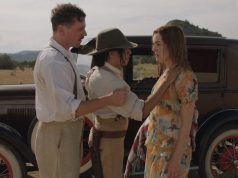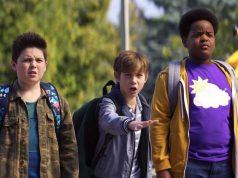In trying to explain the “firms” — what you and I would call “gangs” — that support their favorite British soccer teams by beating up the fans of the opposition, a character in “Green Street Hooligans” cites the rivalry between his team, West Ham United, and the hated Millwall.
“Oh, like the Red Sox and the Yankees,” says his American friend.
“No,” replies the soccer fan. “More like the Israelis and the Palestinians.”
I’m pretty sure these guys beat people up for calling it “soccer,” so we’ll go with “football” from here on out. I knew about football fans’ legendary zeal for the sport, and of course news reports of socc– er, football riots are always good for a laugh.
But I didn’t know about the “firms” until now. We learn about them through the eyes of Matt Buckner (Elijah Wood), an American journalism student who, having been unfairly expelled from Harvard, heads to London to live with his expatriate sister Shannon (Claire Forlani) and her English husband Steve (Marc Warren). Steve’s brother Pete (Charlie Hunnam), as it turns out, is a full-blooded soccer hooligan, leader of West Ham United’s firm.
The firm is a group of two-fisted drinkers and fighters who sit in the local pub all night and represent a strong force at the actual football games. They don’t mess with innocent bystanders — that’s what separates them from American “gangs,” Pete says with some distaste — but they do engage in brawls with opposing teams’ firms whenever possible. Game day means having a few pints at the pub, singing the team song as you walk to the stadium, screaming yourself hoarse during the game, and then beating the crap out of like-minded blokes who spent the day the same way, only in support of a different team.
I don’t need to tell you that this mindset is completely foreign to Matt; he’s played by Elijah Wood, for crying out loud. But Pete likes the kid, and the rest of the Green Street Elite (that’s the name of their firm) soon gets over his American-ness and takes him in as one of their own. All except Bover (Leo Gregory), that is, the scar-faced psycho in the group who doesn’t trust anyone not born on his street, let alone in America.
As the timid and polite Matt is drawn into this world of ruffianism; as he gets into his first battle and throws his first punches; as he grows accustomed to waking up bloody and sore; as he does all this, his confidence improves and he finds himself happier than he’s been in a long time. His absentee father (Henry Goodman), a globe-trotting journalist, urges his son to keep writing, but Matt doesn’t care about reporting anymore. He loves his violent, fearsome new lifestyle.
We’re told early on that football hooligans hate journalists. I don’t know if this is true in real life or not; it seems random, like hating telephone operators or dentists. But in the movie, they hate ’em, and so Matt fibs about what he studied at Harvard. Inevitably, the truth comes out, and there is a schism within the ranks of the Green Street Elite.
It’s hard not to be amused at how seriously everyone treats it. They react to the news that Matt is a journalist in the same way that villains react when they learn one of their own is an undercover cop, or the way Tony Soprano did when he found out Adriana was working with the Feds. All because he’s … A JOURNALIST! DUNH-DUNH-DUNNNNNNH!
The screenplay — by director Lexi Alexander, Dougie Brimson and Josh Shelov — has other pedestrian elements, too, notably in some of the dialogue. Matt’s voice-over narration that begins the film includes the pretentious declaration “What I was about to learn no Ivy League school could teach me.” Later, someone tells him he needs to go back home and he replies, “I don’t know where my home is anymore.” It’s one of those sentiments that is easy to feel — we’ve all felt displaced before — but hard to express in a way that doesn’t sound cheesy.
But the fight scenes are well-choreographed by Alexander, and cut together in a way that enhances their bloody, often graphic, details. It’s a visceral, macho film, and if the message seems to be that violence IS the answer, it’s hard to resist the grimy, eloquent way that the point is made.
B (1 hr., 49 min.; )





